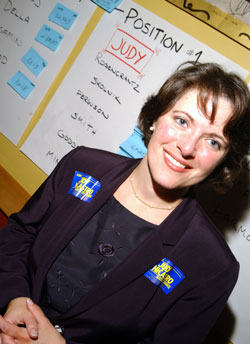THE WEATHER ON primary-election night Tuesday, Sept. 16, was unseasonably cool, but Seattle voters were even chillier. We are looking at an angry electorate that just went out and voted against incumbents, said Christian Sinderman, a political consultant who represents both challengers and incumbents.
Over the past year, every level of government has had its share of bad news. Seattle City Hall was roiled first by stormy battles between Mayor Greg Nickels and the Seattle City Council, then by Strippergatethe imbroglio involving a zoning change at a strip club and thousands of dollars in campaign contributions from ex-cons and their family and friends. And most recently, City Council member Jim Comptons admission of wrongdoing in accepting a ride on a jet owned by billionaire Paul Allen made headlines. Seattle City Lights superintendent, Gary Zarker, was ousted as electric rates soared and the utility staggered under its debt load. The King County Council had to close parks, give away swimming pools, and cut back at the jail in order to cope with a financial shortfall. The Seattle School Districts superintendent, Joseph Olchefske, departed, leaving a huge budget hole behind, while Seattle School Board members struggled to explain their role, or lack of it, in the crisis.
THE VOTERS DIGESTED the information and decided to lodge a protest, across the board. They handed out the lowest set of numbers to City Council incumbents in recent history: No incumbent received as much as 45 percent of the vote, and council member Judy Nicastro was at 25 percent. While all four City Council incumbents led their races, the margins were tight enough and the overall percentages low enough that none of the elected officials will be coasting into the Nov. 4 general election in seven weeks.
On the School Board, two of the three incumbentsfinance chair Steve Brown and board president Nancy Waldmanwere far behind their main challengers. And in Seattles lone contested King County Council Democratic race, challenger Bob Ferguson led 20-year incumbent Cynthia Sullivan by 143 votes out of 19,139 counted on election night. Sullivan contends the City Council problems drove down voter turnout, and those who were discontent made it to the polls and made their feelings known. A lot of people were turned off to politics by the antics at the City Council, Sullivan said. The City Council members are getting killed. Any council member that is below 45 percent is in real trouble. Whoever comes in second can make a pretty good case to the voters that Im not the incumbent.
None of the City Council incumbents would acknowledge any problems, however. Renters advocate Nicastro celebrated her 25 percent of the vote as a victory for an independent voice on the council. City Council member and utility maven Margaret Pageler wouldnt comment on her 36 percent showing, saying the count was not complete. The councils energy chair, Heidi Wills, was upbeat about continuing her fight for working families, economic development, and the environment. She posted a relatively respectable 44 percent but acknowledged that a bad economy and high unemployment led to some low numbers across the board. Former newsman and City Council Public Safety chair Compton, who, despite having nominal opposition, only polled 39 percent, was unavailable for comment.
Said School Board member Brown, who trailed challenger Darlene Flynn by 18 points: There are people who remain unhappy about the financial issues. There are people who are reluctant to follow the reform path weve been on. This is a chance for them to express disapproval.
Moxie Medias John Wyble, who is working with both incumbents and challengers, said his campaigns polling showed the primary electorate, particularly voters over 60, are strongly anti-incumbent. He expects the numbers to be different in November, however, when younger voters turn out in greater numbers.
PRIMARY VOTERS WERENT just shaking up elected officials, however. They also approved Initiative 75 by 59 percent to 41 percent. The new city ordinance will make marijuana laws, as they relate to adult personal use, the citys lowest law-enforcement priority. Seattle becomes the largest city in the U.S. with such a law.
Seattleites dont think adults should go to jail for marijuana, said Dominic Holden, campaign manager for I-75. Voters agreed with us that law enforcement has more important priorities. Others at the smoke-free I-75 victory party in Belltown saw something broader in the vote. It gets people to think more rationally about our drug laws, said Andy Ko, head of the American Civil Liberties Union of Washington. Our drug laws are so knee-jerk.
City Attorney Tom Carr, who campaigned against the measure, said he wasnt surprised by the vote and that his office would not mount a legal challenge, as some had feared. Its the law and Ill enforce every aspect of the law that I can understand, said Carr, referring to the somewhat squishy nature of the law, which neither legalizes nor decriminalizes marijuana use. Itll be for state courts to hammer out precisely what lowest law enforcement priority means.
After standing up for green bud, voters slapped down a 10-cent tax on espresso drinks. The so-called latte tax would have raised millions a year for early-childhood development programs. The initiative was whipped 32 percent to 68 percent, although almost no one senses that voters were disenchanted with little kids.
I think it was the mechanism of the funding that turned off voters, said Stephanie Bowman, a leader of the opposition campaign. Everyone supports these programs, but this is the wrong way to do it. They should be funded by everyone in the community, not by people who buy lattes and mochas.
John Burbank of the Yes on I-77 campaign found a silver lining in the electoral storm. It brought that issue to the attention of decision-makers, he said. They all now say they support early-childhood learning. OK, lets find a funding solution to that problem right away. Burbank said that early childhood proponents might look to a future levy to fund their efforts.




